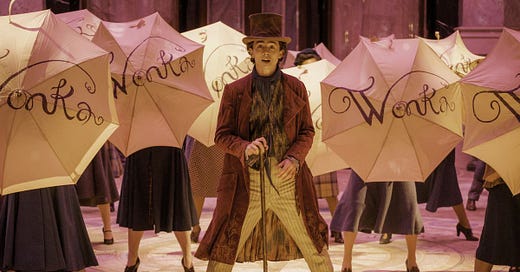'Wonka' Review
Paul King's latest directorial effort feels more in the bland, uninspired style of the Disney live-action remakes than any of his previous charming films
I was offered the part. I read the [Roald Dahl] book. And Mel Stuart, the director, came to my home in New York. He said, ‘You wanna do it?’ and I said, ‘Well, I’ll tell you, I will do it if I can come out, and all the crowd quiets down, and I am using a cane.’ Oh, my God. Willy Wonka is crippled. ‘And I walk slowly and you can hear a pin drop. And my cane gets stuck in a brick. And I fall forward onto my face and do a forward somersault and jump up, and they all start to applaud.’ I said, ‘because no one will know from that point on whether I am lying or telling the truth,' - Gene Wilder on his one stipulation for playing the part of Willy Wonka
Wonka marks the third cinematic outing for the titular character since his 1971 debut in Willy Wonka & the Chocolate Factory, and following the unspoken rule of franchises: the third time isn’t always the charm.
From director Paul King of Paddington 1 & 2 fame (and of The Mighty Boosh fame for real British comedy aficionados) comes a new story exploring the untold origins of a beloved pop culture character, a formula for filmmaking that clearly never goes wrong! Just ask Anakin Skywalker, Han Solo, Galadriel, and Nick Fury: knowing more about these mysterious, intriguing icons definitely improves our love of said characters! The script, by King and frequent collaborator (and fellow Boosh alum) Simon Farnaby, makes sure you know that this isn’t a unique, interesting take on the character, but is most definitely a younger version of the iconic Gene Wilder version of the character, from the chocolate-brown top-hat to the obscure ditty Wonka plays on a flute only once in the original 1971 film.
After Warner Bros. considered a diverse selection of actors (ranging from Ryan Gosling to Donald Glover to Ezra Miller) they settled on their one-and-only Chosen One: Timothée Chalamet. What’s important for context here in this selection is that ever since Joe Biden opened the international film market floodgates (it’s true, folks) and sent Hollywood on its downward spiral of China-pandering, more often that not major casting choices are not determined by directors but rather “international marketing committees” that determine which actors will play well to a variety of countries and demographics…regardless if they can act or are suited to a particular role. Only directors like Spielberg and Nolan really have the power to cast who they want: this is why we have this strange mix of “pseudo-stars” like John David Washington, Anya Taylor-Joy, and Zendaya, who despite being fine-enough actors, have risen to levels of stardom that only the most talented and hard-working actors could once achieve. This is the only real explanation for the otherwise inexplicable rise of one Chalamet: a decent-enough actor who really excels when playing whiny teenagers. Act what you know, right?
In this film, Chalamet gives one of the most embarassing and baffling performances I have ever seen from a lead-role actor since…maybe Hayden Christensen as Anakin Skywalker? (I throw more of the criticism at George Lucas’ direction for that one, anyway). Seriously, when you get out-acted by CGI Hugh Grant as an Oompa-Loompa (unironically the all-too-brief highlight of the movie), it may be time to step back and reconsider how versatile you are as an actor. Not to mention that every single song he sings is aggressively autotuned to the point that I’m not even sure if it’s him singing or if it’s an AI program designed to mimic what Timothée singing should sound like. The actor’s attempts at “whimsy” and “charm” just make him seem that much more insincere, a real problem when the basic demands of fiction require you to have a protagonist that is remotely relatable.
Chalamet is surrounded by a typically excellent supporting cast including Olivia Colman, Keegan-Michael Key, and Rowan Atkinson, but none of them really get a chance to play to their utmost comic skills in the way that the ensemble cast always could in King’s far superior Paddington films. The Paddington films are a really good comparison point for this in what a film based on a beloved British literary character should look like, with a sincere performance by Ben Whishaw as the titular bear (and the incredible VFX team that brought him to life) surrounded by an entire cast that makes you believe he’s undoubtedly real and goes so far as to make you care about this fictional animal. There’s nothing within Wonka that gives you any reason to care about the character except for a forced semi-tragic backstory that more tragically underutilizes Sally Hawkins, yet another Paddington alum who should’ve been given more to do within the film.
Ultimately, Wonka is the first outing for the character that completely misses what made the stories of Roald Dahl great: the mix of wonder, darkness, and imagination that live large in the minds of both children and adults alike. For a better adaptation of Dahl’s stories, this reviewer recommends Wes Anderson’s recent anthology series on Netflix, beginning with The Wonderful Story of Henry Sugar over this bland, meaningless retread of a popular IP.
Also, check out the Paddington movies if you haven’t already!





